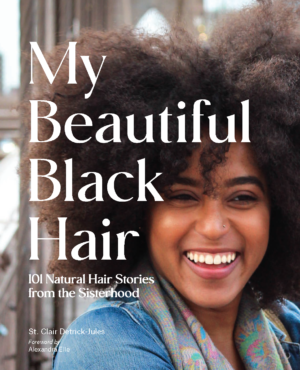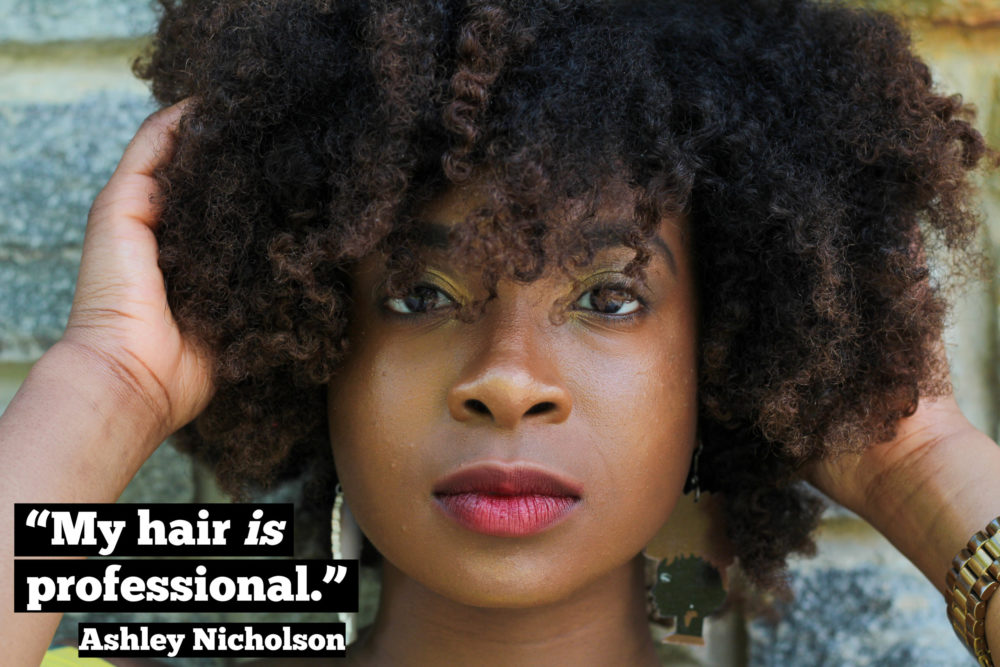These days, it’s not uncommon to see Black women wearing their natural hair. Something unheard over twenty years ago. Back then, sporting one’s kinks, coils, and curls was not socially acceptable. Forcing women to chemically alter their hair texture. Giving them that desired bone, straight, European look, that attracted the eyes of many.
 This all changed with the onset of the “natural hair movement”. A mass exodus of women abandoning their coveted relaxers in favor of afros, braids, twists, locs, and cornrows. Giving them the space to embrace the hair that grew from their heads. Further allowing them to cultivate a newfound relationship with their curls. It was bold. It was radical. It was freeing.
This all changed with the onset of the “natural hair movement”. A mass exodus of women abandoning their coveted relaxers in favor of afros, braids, twists, locs, and cornrows. Giving them the space to embrace the hair that grew from their heads. Further allowing them to cultivate a newfound relationship with their curls. It was bold. It was radical. It was freeing.
Yet, while there is more acceptance surrounding Black women’s hair, there are some who are still singled out because of it. From boardrooms to classrooms, many women sometimes experience ridicule and harsh criticisms. Often resulting in them feeling shame or questioning their beauty.
One woman, however, is on a mission to encourage Black women to celebrate their hair with her new book, My Beautiful Black Hair. In it, author and photographer, St. Clair Detrick-Jules collected 101 empowering stories. Resulting in a natural hair love letter to Black women across the country.
The Chicago Defender recently talked with St. Clair about her book, the inspiration behind it, and reclaiming our African heritage through our hair.
What was the inspiration for My Beautiful Black Hair?
St. Clair Detrick-Jules: One day, my sister, Khloe, came home crying to my dad about how she was being bullied because of her hair. They live in France and my dad had to call and tell me about it. She was so upset that she didn’t want to go to school, and my first reaction was anger.
I didn’t have any productive solutions at first. So it took me a couple of months to solidify this idea that I wanted to show her Black women and girls who looked like her. I was in my last semester of college at the time and I was thinking about doing a project on police brutality. But once I finished, I realized that doing a project on Black hair would not only help my sister but would also bring me a lot of joy. So I pivoted a few months after and set out on this mission to collect these photos and stories.
What was that process like for you?
St. Clair Detrick-Jules: It was a journey. At first, I just reached out to some of my friends and former classmates with natural hair, asking them to be a part of this project. I didn’t have the term “photojournalism book” at the time. So I explained that I was doing some sort of project and asked if I could interview them and take their pictures. I also mentioned that it was for my little sister.
The responses that I got were really great from my friends and acquaintances. I was also able to tap into the natural hair community through Instagram. So some of the women I didn’t even know, ahead of time, but I was so honored that they were open to being part of this project.
Did you initially set out to collect 101 stories?
St. Clair Detrick-Jules: No. At first, I thought to include 50 women. Then I realized I wanted to continue interviewing even more. So then it got to 100 women and then 101.
But it’s been really amazing to see people relate to the book. I have an uncle who lives in Jackson, Mississippi, and he was telling a young Black woman about my book, and she had already heard of it. He said that she even pulled it up on her phone, saying that she wanted to get it. And I thought that was so cool.
It’s so amazing that I have family members and friends who have been supporting me. But then to have the additional support from strangers is especially validating. Because these aren’t people who are only buying my book because they know me. They are people who are genuinely interested in reading the book for their own pleasure. And that makes me happy.
Aside from a celebration of hair, would you say that the universal theme of My Beautiful Black Hair is self-love?
St. Clair Detrick-Jules: Definitely. I think everyone of all demographics should love themselves. It is an ongoing journey for a lot of us. And I think it’s hard to be at a place where we love ourselves all the time.
For me, there are days when I don’t love myself as much as I should. Even though I’m an advocate for self-love, I constantly have to affirm myself. But I love when other people love themselves. I love spending time with people who love themselves and who are working to love themselves even more because it rubs off on me.
 What are some other key takeaways from your book?
What are some other key takeaways from your book?
St. Clair Detrick-Jules: Embracing our Blackness and embracing our heritage. My dad is Caribbean. So I’m Afro-Caribbean. A lot of the women in the book are also Afro-Caribbean and African-American. But there aren’t many who can trace their roots back to Africa.
Several people brought up the importance of our ancestors when it comes to our natural hair. So even though we may not be able to trace our roots directly, we have our hair, which is a signifier of our African heritage. And it’s something to be proud of because it is a gift from our ancestors.
One of the women in the book talks about colonialism and how we connect with our ancestors despite that. She said one of the ways is by reclaiming our hair, and our facial features. All of these aspects about us that make us Black are important. So it’s important for us to do that to reclaim our Blackness and our African heritage.
What does the future hold for you and My Beautiful Black Hair?
St. Clair Detrick-Jules: Well, Target recently ordered copies of my book! So for Black History Month, My Beautiful Black Hair will be available in all Targets nationwide. But I want to continue the conversation about Black hair.
I was recently at Trinity Washington University here in DC, giving a presentation on my blog and Black hair. Then we had a group discussion afterward about hair and self-love. So it’s something that I want to continue working on. It doesn’t end with this physical product. That’s a book.
These conversations are important for us to keep going for people of all ages, demographics, and genders. In my career, I do want to continue using storytelling as a vehicle for social change. And I want to continue highlighting marginalized voices in a way that brings us joy.
I love where the natural hair movement is going. And I hope that my book is an affirmation for Black women with all-natural hair types. I want Black women to see themselves and know that they are loved throughout this book.
To purchase My Beautiful Black Hair: 101 Natural Hair Stories from the Sisterhood, visit https://www.chroniclebooks.com/products/my-beautiful-black-hair.
Contributing Writer Racquel Coral is a national lifestyle writer and journalist based in Chicago, Illinois. Find her on all social media platforms @withloveracquel.



